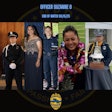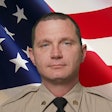![[|CREDIT|]](https://img.policemag.com/files/base/bobit/publicsafety/image/2019/07/pm.david_griffith_2017.jpg?auto=format%2Ccompress&fit=max&q=70&w=400)
Back in the late 1970s when I took my first college news writing class, I learned you never publish the names of rape victims or suicides. Yes, believe it or not, newspapers and broadcast media once had rules. In general, we didn't cover suicides by name unless the person was famous.
The suicide rule was in place out of respect to the families. But maybe it was in the long run a disservice to the families and to other people contemplating suicide. We've found in recent years that it's better to talk about suicide rather than push it into that crowded closet of things we don't talk about.
So here at POLICE, we find ourselves covering officer suicides and naming names. And that's because we have a suicide problem in America. The Centers for Disease Control and Prevention says that 47,000 Americans killed themselves in 2017. Little kids are killing themselves, old people, young men, young women, middle-aged people, people of all ethnicities, and people in all professions.
It is widely believed that cops are more prone to suicide than most Americans. That could be because most cops are young to middle-aged men with access to firearms or it could be because of something in police culture or the profession itself. No one really knows.
One reason for that uncertainty is that it's hard to come by accurate statistics for how many officers are taking their own lives. BlueH.E.L.P., an organization that tracks officer suicides and tries to prevent them, says 158 officers killed themselves in 2018. The organization says that the number of officers could be even higher because police agencies are reluctant to label officer deaths as suicides. Some experts estimate that as many as 400 law enforcement officers take their own lives each year.
The reasons for suicide can be hard to fathom for those left behind, but I believe it comes down to two things: a loss of hope and a loss of self. In a song about the suicide of a fellow British rock star titled "A Day Without Me," the band U2 once summed this up as "starting a landslide in my ego."
That loss of hope and loss of self can be seen in last month's suicide of NYPD Deputy Chief Steven Silks. At 62, Silks faced mandatory retirement. It's believed he killed himself because he could no longer do the job that defined him. He lost himself. I don't know if that's true. But if it is, I wish somebody could have persuaded him to speak with the many retired officers who are still doing great work and serving their communities. I know dozens of them. They are working with other agencies, or as trainers, expert witnesses, journalists, attorneys representing officers, and consultants…and their identities haven't changed one bit: They are still great cops.
It all comes down to talking. You can't save everybody. And don't blame yourself if you can't. But if the person still has any hope, any desire to keep living, then it's possible they can be reached, if someone will talk to them.
So we are now posting the news items with names of suicides on PoliceMag.com, and we are publishing articles like this in the print magazine of POLICE. And I am still not 100% comfortable with it. The 20-year-old news writing student still inside me is screaming: NO!
But let him scream. The only way to address suicide and possibly prevent some suicides is to talk openly and frankly about it.
But I assure you that we will always cover them with the gravitas they deserve. We will also when possible include information on how to get help in these stories.
Here it is: If you or someone you know has ideation of suicide or is approaching crisis, please know that the National Suicide Prevention Lifeline (1-800-273-8255) provides 24/7, free and confidential support for people in distress. Safe Call Now (1-206-459-3020) offers those services specifically for first responders.
On a website maintained by BlueH.E.L.P.—an organization that tracks officer suicides while simultaneously seeking to prevent such tragedies from occurring—a first responder need only enter a few data points—such as their location and what kind of assistance is needed—and the individual will be provided with a list of options for help from a searchable database dedicated to helping first responders find emotional, financial, spiritual, and other forms of assistance.














